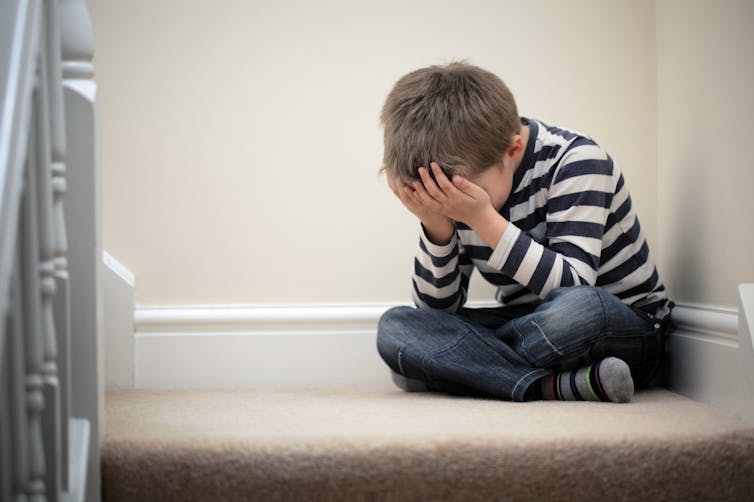Why a US task force is recommending anxiety screening in kids 8 and older

Brian A. Jackson/iStock via Getty Images
Elana Bernstein, University of Dayton
The U.S. Preventive Services Task Force issued a draft statement in April 2022 recommending screening for anxiety in children and adolescents between the ages of 8 and 18. This recommendation – which is still open for public comment – is timely, given the impact of the COVID-19 pandemic on children’s mental health. The Conversation asked Elana Bernstein, a school psychologist who researches child and adolescent anxiety, to explain the task force’s new draft recommendations and what they might mean for kids, parents and providers.
1. Why is the task force recommending young kids be screened?
Nearly 80% of chronic mental health conditions emerge in childhood, and when help is eventually sought, it is often years after the problem’s onset. In general, recommendations to screen for mental health disorders are based on research demonstrating that youths do not typically seek help independently, and that parents and teachers are not always skilled at correctly identifying problems or knowing how to respond.
Anxiety is the most common mental health problem affecting children and adolescents. Epidemiological studies indicate that 7.1% of children are diagnosed with anxiety disorders. However, studies also estimate that upwards of 10% to 21% of children and adolescents struggle with an anxiety disorder and as many as 30% of children experience moderate anxiety that interferes with their daily functioning at some time in their life.
This tells us that many kids experience anxiety at a level that interferes with their daily functioning, even if they are never formally diagnosed. Additionally, there is an established evidence base for treating childhood anxiety.
The opportunity to prevent potentially chronic lifelong mental health conditions through a combination of early identification and evidence-based treatment certainly informed the task force’s recommendation. Untreated anxiety disorders in children result in added burdens to the public health system. So from a cost-benefit perspective, the cost-effectiveness of screening for anxiety and providing preventive treatment is favorable, while, as the task force pointed out, the harms are negligible.
The task force recommendation to screen kids as young as age 8 is driven by the research literature. Anxiety disorders are most likely to first show up during the elementary school years. And the typical age of onset for anxiety is among the earliest of all childhood mental health diagnoses.
Anxiety disorders can persist into adulthood, particularly those disorders with early onsets and those that are left untreated. Individuals who experience anxiety in childhood are more likely to deal with it in adulthood, too, along with other mental health disorders like depression and an overall diminished quality of life.
2. How can care providers identify anxiety in young kids?
Fortunately, in the past three decades, considerable advances have been made in mental health screening tools, including for anxiety. The evidence-based strategies for identifying anxiety in children and adolescents are centered on collecting observations from multiple perspectives, including child, parent and teacher, to provide a complete picture of the child’s functioning in school, at home and in the community.
Anxiety is what’s called an internalizing trait, meaning that the symptoms may not be observable to those around the person. This makes accurate identification more challenging, though certainly possible. Therefore, psychologists recommend including the child in the screening process to the degree possible based on age and development.
In general, it is easier to accurately identify anxiety when the child’s symptoms are behavioral in nature, such as refusing to go to school or avoiding social situations. While the task force recommended that screening take place in primary care settings, the research literature also supports in-school screening for mental health problems, including anxiety.
Among the youths who are actually treated for mental health problems, nearly two-thirds receive those services at school, making school-based screening a logical practice.
3. How would the screening be carried out?
Universal screening for all children is a preventive approach to identifying youths who are at risk. This includes those who may need further diagnostic evaluation or those would benefit from early intervention.
In both cases, the aim is to reduce symptoms and to prevent lifelong chronic mental health problems. But it is important to note that a screening does not equal a diagnosis. Diagnostic assessment is more in-depth and costs more, while screening is intended to be brief, efficient and cost-effective. Screening for anxiety in a primary care setting may involve completion of short questionnaires by the child and/or parent, similar to how pediatricians frequently screen kids for attention-deficit/hyperactivity disorder, or ADHD.
The task force did not recommend a single method or tool, nor a particular time interval, for screening. Instead, it pointed to multiple tools such as The Screen for Child Anxiety Related Emotional Disorders and the Pediatric Symptom Checklist. These assess general emotional and behavioral health, including questions specific to anxiety. Both are available at no cost.
4. What are care providers looking for when screening for anxiety?
A child’s symptoms can vary depending on the type of anxiety they have. For instance, social anxiety disorder involves fear and anxiety in social situations, while specific phobias involve fear of a particular stimulus, such as vomiting or thunderstorms. However, many anxiety disorders share symptoms, and children typically do not fit neatly into one category.
But psychologists typically observe some common patterns when it comes to anxiety. These include negative self-talk such as “I’m going to fail my math test” or “Everyone will laugh at me,” and emotion regulation difficulties, like increased tantrums, anger or sensitivity to criticism. Other typical patterns include behavioral avoidance, such as reluctance or refusal to participate in activities or interact with others.
Anxiety can also show up as physical symptoms that lack a root physiological cause. For example, a child may complain of stomachaches or headaches or general malaise. In fact, studies suggest that spotting youths with anxiety in pediatric settings may simply occur through identification of children with medically unexplained physical symptoms.
The distinction we are aiming for in screening is identifying the magnitude of symptoms and their impact. In other words, how much do they interfere with the child’s daily functioning? Some anxiety is normal and, in fact, necessary and helpful.
5. What are the recommendations for supporting kids with anxiety?
The key to an effective screening process is that it be connected to evidence-based care. One strategy that is clearly supported by research is for schools to establish a continuum of care that involves universal screening, schoolwide prevention programming and evidence-based treatment options.
The good news is that we have decades of high-quality research demonstrating how to effectively intervene to reduce symptoms and to help anxious youth cope and function better. These include both medical and nonmedical interventions like cognitive behavioral therapy, which studies show to be safe and effective.
Elana Bernstein, Assistant Professor of School Psychology, University of Dayton
This article is republished from The Conversation under a Creative Commons license. Read the original article.
















